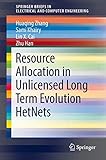Resource Allocation in Unlicensed Long Term Evolution HetNets [electronic resource] / by Huaqing Zhang, Sami Khairy, Lin X. Cai, Zhu Han.
By: Zhang, Huaqing [author.] .
.
Contributor(s): Khairy, Sami [author.] | Cai, Lin X [author.]
| Cai, Lin X [author.] | Han, Zhu [author.]
| Han, Zhu [author.] | SpringerLink (Online service)
| SpringerLink (Online service) .
.
Material type:  BookSeries: SpringerBriefs in Electrical and Computer Engineering: Publisher: Cham : Springer International Publishing : Imprint: Springer, 2018Edition: 1st ed. 2018.Description: V, 115 p. 47 illus., 31 illus. in color. online resource.Content type: text Media type: computer Carrier type: online resourceISBN: 9783319683126.Subject(s): Telecommunication
BookSeries: SpringerBriefs in Electrical and Computer Engineering: Publisher: Cham : Springer International Publishing : Imprint: Springer, 2018Edition: 1st ed. 2018.Description: V, 115 p. 47 illus., 31 illus. in color. online resource.Content type: text Media type: computer Carrier type: online resourceISBN: 9783319683126.Subject(s): Telecommunication1 Introduction -- 2 Radio access management of Unlicensed LTE -- 3 Game theory based spectrum sharing -- 4 Spectrum Matching in Unlicensed Band with User Mobility -- 5 Traffic offloading from licensed band to unlicensed band -- 5 Conclusions and Future Works.
This SpringerBrief investigates cross layer resource allocation in unlicensed LTE (Long Term Evolution) HetNets. Specifically, the authors study and cover the radio access management of unlicensed LTE to allow efficient spectrum utilization and harmonious coexistence with other unlicensed systems in this brief. Efficient radio access protocols are developed to allow unlicensed LTE users to fair share channel access with unlicensed users in different systems, including Wi-Fi and unlicensed LTE of other operators. An analytical model is developed to study the performance of the proposed protocols. To achieve efficient spectrum sharing among various unlicensed users, the authors further formulate a resource allocation problem based on Nobel Prize winning game theory framework, and propose efficient algorithms to achieve the maximal user utility. Opportunistic traffic offloading from licensed band to unlicensed bands is also investigated, based on the network formation game. By exploiting the characteristics of mobile social networks, the offloading performance can be further enhanced. This brief targets researchers and engineers from both academia and industry interested in the development of LTE over unlicensed bands, as well as the design and implementation of cross layer radio resource management. Students studying electrical engineering and computer science will also find this brief useful for their studies.


There are no comments for this item.